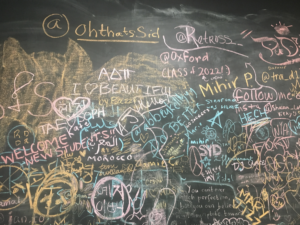Written by: Katherine Ahn
Language is the human ability that I am afraid to lose. One of the most unique elements of being human is how we acquire language and the complexity of the language that we use. Without knowing and using languages, I would lose so much of the rewarding experiences that languages offer, such as interacting with others and expressing myself.
One part of Emory’s student culture that has not changed ever since my arrival is the library’s ambiance. The Woodruff library is a community space, where students come to study and socialize. You walk in the library and check in, using your Emory card. In passing the second floor, each study table has its own designated language including students from Korea, China, Costa Rica, Puerto Rica, India, etc. The Woodruff library is one example of a community where different languages thrive and develop. Here at Emory, languages, traditions, sciences, mathematics, and liberal arts converge. In this way, no matter where you are from, there is an opportunity to learn, experiment, and excel in the liberal arts.

Multilingualism at Emory’s Starbucks
While a liberal arts education struggles to overcome the high demand of students pursuing a STEM-related career, a decline in foreign language education can have devastating effects for future generations, especially since knowing a foreign language is becoming ever more essential. If foreign languages are sustained and improved in a liberal arts education, then a multicultural education is created. Colleges need to recognize the importance of their foreign language education programs to avoid becoming linguistically and culturally lacking. When students have access to a liberal arts education that requires foreign language requirements, they have a better chance at becoming global citizens, enriching the world with diversity.
I believe students in a liberal arts education must recognize the importance of sustaining foreign language education by actively using different languages and participating in platforming cultural clubs throughout campus. If students show increased demonstration of interest and need for expansion of cultures and languages in their education, then parents, faculty members and personnel in higher institutions can lobby for language programs anywhere.
As much as I advocate exploring languages and cultures during one’s time in undergrad, the liberal arts education is not for everyone. For me however, the implementation of foreign languages in a liberal arts education is critical to a student’s growth and development. Not only do foreign languages build a whole new level of understanding in connecting with people, it deepens my understanding of my personal identity. Learning a new language paves the way for creating experiences and finding similarities and differences among the people that I come into contact with. It is not only about acknowledging and respecting those differences with the people that we come across, but it is more so recognizing the similarities within those differences. At the end of the day, implementing the study of foreign languages and cultures has its base in taking risks to seek experiences that are outside of one’s comfort zone. I am not simply encouraging a “call to action,” in learning about foreign cultures, but more so, a call to “self-reflection” about what a liberal arts education should encourage students to explore.